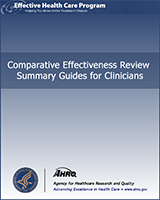From: Attention Deficit Hyperactivity Disorder in Children and Adolescents

Comparative Effectiveness Review Summary Guides for Clinicians [Internet].
Rockville (MD): Agency for Healthcare Research and Quality (US); 2007-.
NCBI Bookshelf. A service of the National Library of Medicine, National Institutes of Health.


